
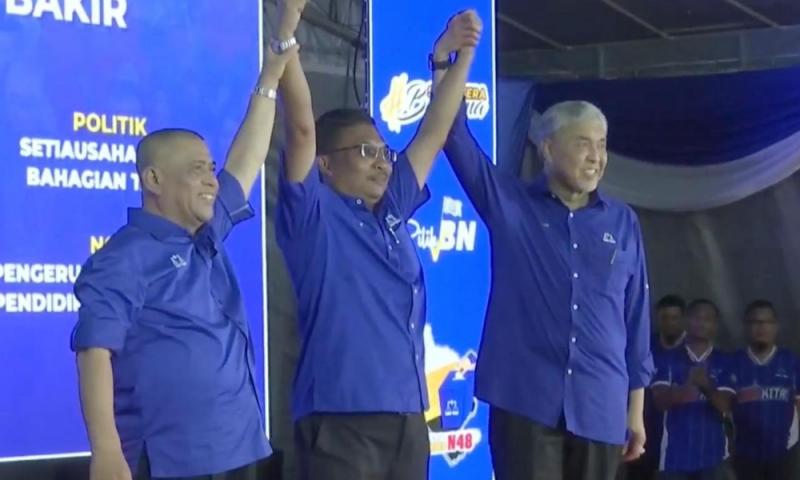

COMMENT | Umno's advantage: Ayer Kuning by-election Part 1
Bridget Welsh
Published: Apr 10, 2025 10:38 AM
Updated: 1:55 PM
COMMENT | Malaysia heads to another by-election campaign this weekend, the 13th overall since the 2022 general election.
This one involves a semi-rural state seat in southern Perak near the small town of Bidor and located in the parliamentary seat of Tapah.
The Ayer Kuning seat is a multiethnic one comprised of 56 percent Malays, 22 percent Chinese, 14 percent Indians and 8 percent Orang Asli.
The composition reflects the diversity of the area, which has a history of traditional Malay kampungs, Chinese new villages, historic Orang Asli settlements and rubber estates where Indian families still reside.
Just two hours north of Kuala Lumpur, the area retains the old charm and challenges of the past.
The election outcome will not impact the balance of power within Perak where the Madani government holds a six-seat (54 percent) majority in the state assembly.
Yet the polls provide an important political barometer, particularly of the strength of Umno within the Madani government, PAS as opposition and the status of the seriously weakened BN coalition.
The polls will also draw attention to the inattention to the problems of semi-rural development, in a constituency where there still is a whopping 13 percent incidence of poverty (DOSM 2022), concentrated among the largely Madani-neglected Orang Asli and Indian communities.
It will showcase policy deficits toward smaller minorities, even as the campaign dominated by Malay parties largely will centre on winning over Malays.
This first piece on the by-election looks at previous voting behaviour in the constituency, contextualising the contest in Malaysia’s transforming politics.
A traditional Umno seat amidst political transformations
Southern Perak has experienced significant political change in the past decade.
Traditionally, this area was known as a base for BN, with Umno, MCA, and MIC working collaboratively and holding onto these seats.
Perak’s shift in political fortunes began in 2008, when Umno lost the state government. Importantly, this involved gains by PKR, DAP and PAS who then collaborated after this general election as part of Pakatan Rakyat.
Southern Perak was largely not part of the state’s 2008 political change.
The erosion of BN support would not start to happen until 10 years later. In 2018 Pakatan Harapan would gain seats in the region, notably Tanjong Malim.
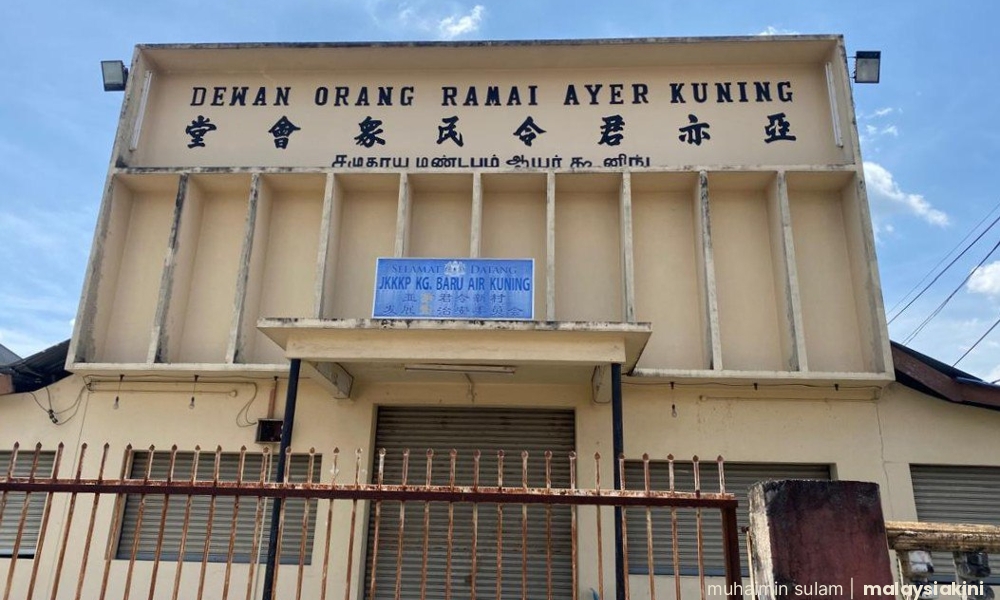
In 2022, PAS emerged stronger winning Pasir Salak easily as Umno’s support fell to record lows.
Nevertheless, Tapah would stay in MIC hands, the party’s sole Parliament seat, in part due to the persistent strength of BN as an alliance in this constituency. This would spill over for another Umno victory at the state level in Ayer Kuning.
Since it was formed in 1986, the state seat of Ayer Kuning has been won by Umno.
It is part of their traditional core political base, even as Umno support in the constituency fell by over a third from 2008 to 2022.
This core strength will put the party in an advantageous position going into this coming polls.
Published: Apr 10, 2025 10:38 AM
Updated: 1:55 PM
COMMENT | Malaysia heads to another by-election campaign this weekend, the 13th overall since the 2022 general election.
This one involves a semi-rural state seat in southern Perak near the small town of Bidor and located in the parliamentary seat of Tapah.
The Ayer Kuning seat is a multiethnic one comprised of 56 percent Malays, 22 percent Chinese, 14 percent Indians and 8 percent Orang Asli.
The composition reflects the diversity of the area, which has a history of traditional Malay kampungs, Chinese new villages, historic Orang Asli settlements and rubber estates where Indian families still reside.
Just two hours north of Kuala Lumpur, the area retains the old charm and challenges of the past.
The election outcome will not impact the balance of power within Perak where the Madani government holds a six-seat (54 percent) majority in the state assembly.
Yet the polls provide an important political barometer, particularly of the strength of Umno within the Madani government, PAS as opposition and the status of the seriously weakened BN coalition.
The polls will also draw attention to the inattention to the problems of semi-rural development, in a constituency where there still is a whopping 13 percent incidence of poverty (DOSM 2022), concentrated among the largely Madani-neglected Orang Asli and Indian communities.
It will showcase policy deficits toward smaller minorities, even as the campaign dominated by Malay parties largely will centre on winning over Malays.
This first piece on the by-election looks at previous voting behaviour in the constituency, contextualising the contest in Malaysia’s transforming politics.
A traditional Umno seat amidst political transformations
Southern Perak has experienced significant political change in the past decade.
Traditionally, this area was known as a base for BN, with Umno, MCA, and MIC working collaboratively and holding onto these seats.
Perak’s shift in political fortunes began in 2008, when Umno lost the state government. Importantly, this involved gains by PKR, DAP and PAS who then collaborated after this general election as part of Pakatan Rakyat.
Southern Perak was largely not part of the state’s 2008 political change.
The erosion of BN support would not start to happen until 10 years later. In 2018 Pakatan Harapan would gain seats in the region, notably Tanjong Malim.

In 2022, PAS emerged stronger winning Pasir Salak easily as Umno’s support fell to record lows.
Nevertheless, Tapah would stay in MIC hands, the party’s sole Parliament seat, in part due to the persistent strength of BN as an alliance in this constituency. This would spill over for another Umno victory at the state level in Ayer Kuning.
Since it was formed in 1986, the state seat of Ayer Kuning has been won by Umno.
It is part of their traditional core political base, even as Umno support in the constituency fell by over a third from 2008 to 2022.
This core strength will put the party in an advantageous position going into this coming polls.
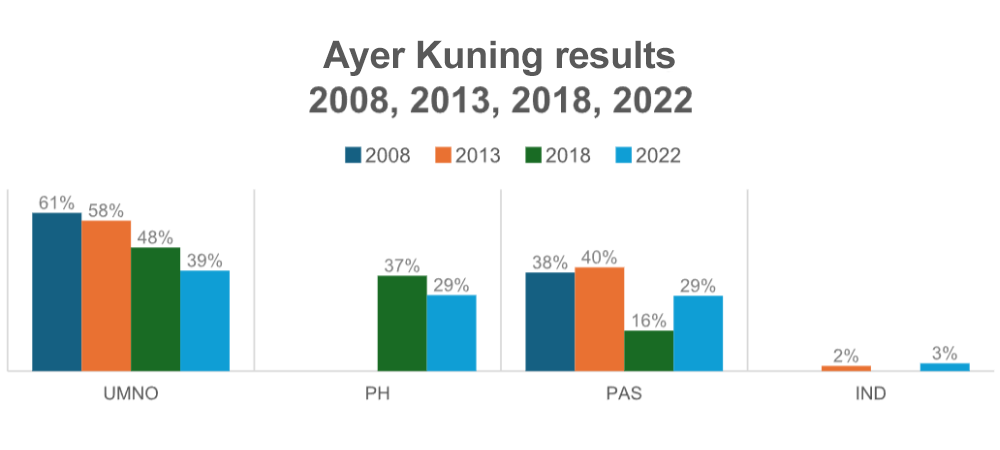
Over time, however, Umno has lost ground to both Harapan and PAS in this seat.
Amanah opted to “give up” the seat to Umno, following the principle of incumbent party contests even though it won 29 percent of the vote in 2022, leaving PAS as the strongest opposition party.
It is important to understand that PAS has struggled to win Ayer Kuning. Its closest chance came in 2013 as part of Harapan.
This was when PAS adopted a more genuine multiethnic electoral framework. And while it made gains among younger voters (and lower gains among older voters) in 2022, these gains were lower than a decade earlier. PAS goes into this contest with a serious disadvantage.
Recent by-election voting trends, including among younger voters, suggest PAS will struggle to maintain its current level of support as the party is losing support to Umno.
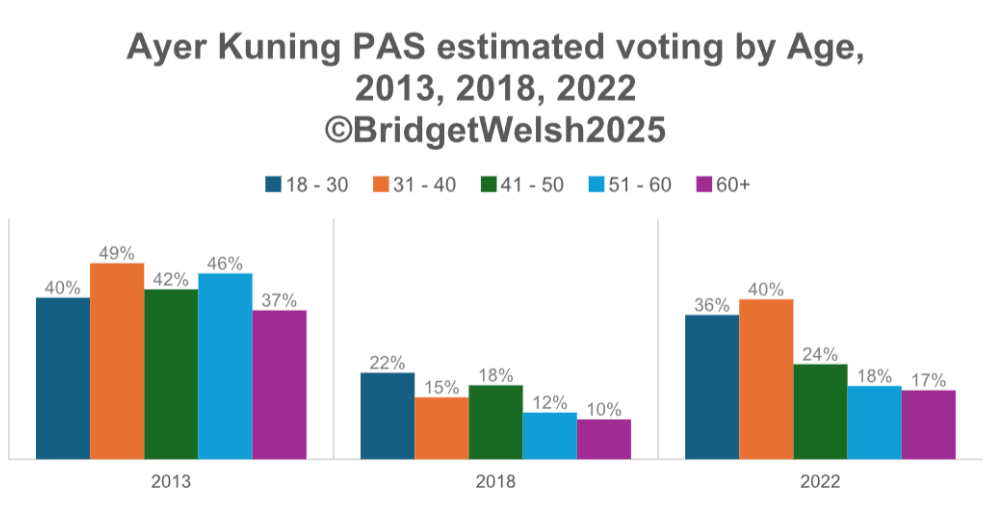
As such, expect the contest between PAS and Umno to be heated, as the candidate selection already points to a contest over political Islam.
PAS wrestles with a narrow focus on a religion-focused campaign, especially in a multiethnic constituency where exclusionary discourse alienates support across communities.
Umno still maintains the advantage over PAS in multiethnic constituencies, especially where BN still survives albeit severely weakened.
Turnout drop expected
Two factors associated with voting behaviour are important to watch.
One is voter turnout, which has been high in Ayer Kuning as a result of strong party machinery and mobilisation and proximity to Kuala Lumpur. Outside voters usually return home.
The high turnout has been associated with general elections, as the state polls have coincided with national polls.
This high turnout is likely to shift, as the national mood is significantly less enthusiastic towards politics.
What will be important for Umno is the support of non-Malays, two communities that have shown the biggest drop in voter engagement.
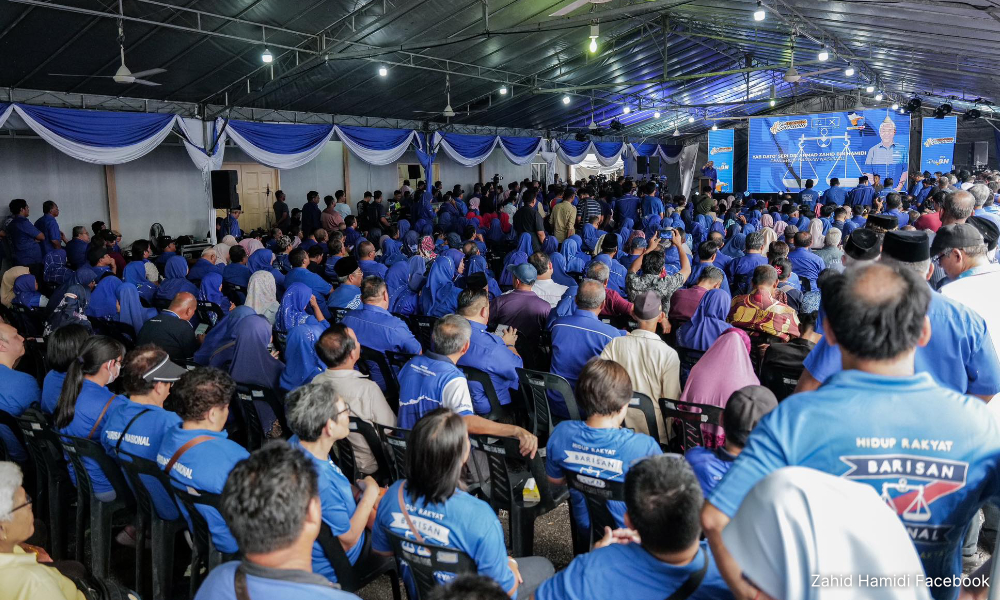
Younger voters will also be important to watch, as many are living outside.
Turnout will have to drop precipitously to under 50 percent for Umno to lose the seat, but this has happened before in other by-elections.
With the widespread perception of “no choice” in a campaign where the outcome won’t be seen to matter, the parties will have to work hard to bring out their base.
MIC’s dilemmas
A second issue to assess is Indian support. The party that will be crucial in shaping the outcome is MIC. It has strong machinery on the ground but will face a question about what to do with it.
The party faces a dilemma – on the one hand, it will be expected to deliver the vote to Umno and the Madani government, especially among the Indian community, to show its relevance and that of a functioning BN.
MIC has already made repeated public assurances it will do so. A weak outcome in mobilisation could potentially further marginalise the party and speak to the further decline of a BN alliance that is already in need of life support.
On the other hand, this by-election is an opportunity to showcase the importance of the Indian vote, who make up a pivotal 14 percent of the seat’s electorate, to send a signal to both Umno and Prime Minister Anwar Ibrahim on the costs of BN and Indian neglect, respectively. Emotions are high among many in the community.
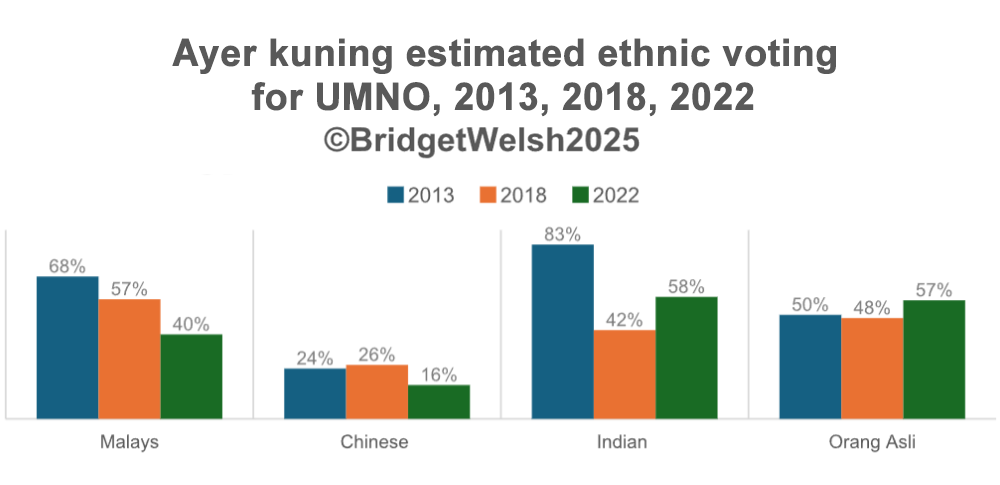
Previous voting patterns among Indians suggest they have been the swing voters in this constituency, leaving Umno in droves with support cut in half in 2018, from an estimated 83 percent to 42 percent for Umno-BN.
Support to Umno increased by an estimated 16 percent in 2022, but still far below earlier levels.
Many Indians supported Harapan in the last GE, a decision some regret. Their vote in this election, and how MIC engages the community will be significant. PSM is hoping to capture a higher share of the vote.
Balance and a multiethnic electorate
All of the communities matter in this by-election, as they all comprise important shares of the electorate.
The contest is a multiethnic one, and outreach across communities will be essential. The main parties contesting risk alienation with an ethnicised campaign.
Orang Asli voting, for example, has been split and competitive, with Umno only winning an estimated 58 percent of these communities in 2022.
The concerns of these communities have the potential to garner attention. Umno’s Malay support in the last election reached an estimated low of 40 percent, and they will be aiming to increase this, even marginally.
Umno will also expect its Madani partners to convince the Chinese voters to vote for them as it only won an estimated 16 percent last time, with a parallel approach of blaming this community and its Mandani ally DAP for any underperformance.
Umno’s appointment of a religious scholar as its candidate will make outreach to non-Malays harder than was the case in last year’s Mahkota by-election where the candidate was seen as able to engage across communities, including fluency in Mandarin.
The campaign ahead
Three candidates have already been announced: Umno’s Yusri Bakir, PAS’s Abdul Muhaiman Malek and PSM’s Bawani KS, who is the only female contesting and the only candidate (so far) that has contested before.
They will also face upward battles to get out the vote at a time when voters are less engaged.
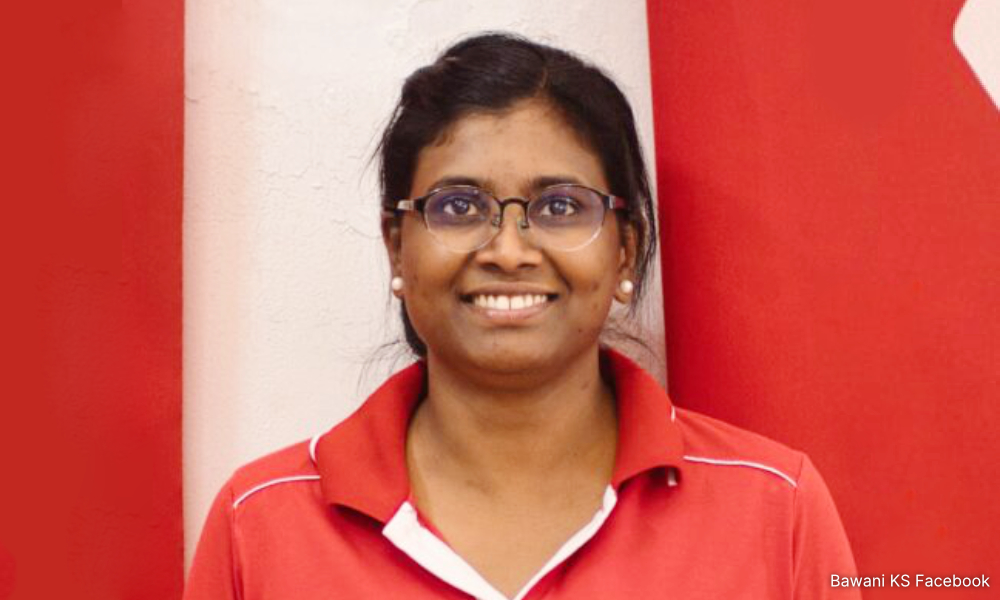
PSM’s Bawani KS
What will be important in the campaign is whether it can move toward substantive discussions that move Malaysia forward, or whether it will be locked in past narratives and practices. Sadly, the latter is more likely.
The Ayer Kuning by-election does have the opportunity to showcase voters’ concerns. Low turnout and swings in support will be important to watch.
Given the strong advantage that Umno faces, the polls are less of a midterm barometer of the government, but rather a measure of party strength, alliances and voter engagement.
And while this may not matter much in the election result, these factors and the treatment of communities and partners do.
What will be important in the campaign is whether it can move toward substantive discussions that move Malaysia forward, or whether it will be locked in past narratives and practices. Sadly, the latter is more likely.
The Ayer Kuning by-election does have the opportunity to showcase voters’ concerns. Low turnout and swings in support will be important to watch.
Given the strong advantage that Umno faces, the polls are less of a midterm barometer of the government, but rather a measure of party strength, alliances and voter engagement.
And while this may not matter much in the election result, these factors and the treatment of communities and partners do.
BRIDGET WELSH is an honorary research associate of the University of Nottingham’s Asia Research Institute, a senior research associate at Hu Fu Centre for East Asia Democratic Studies, and a senior associate fellow at The Habibie Centre. Her writings can be found at bridgetwelsh.com

No comments:
Post a Comment